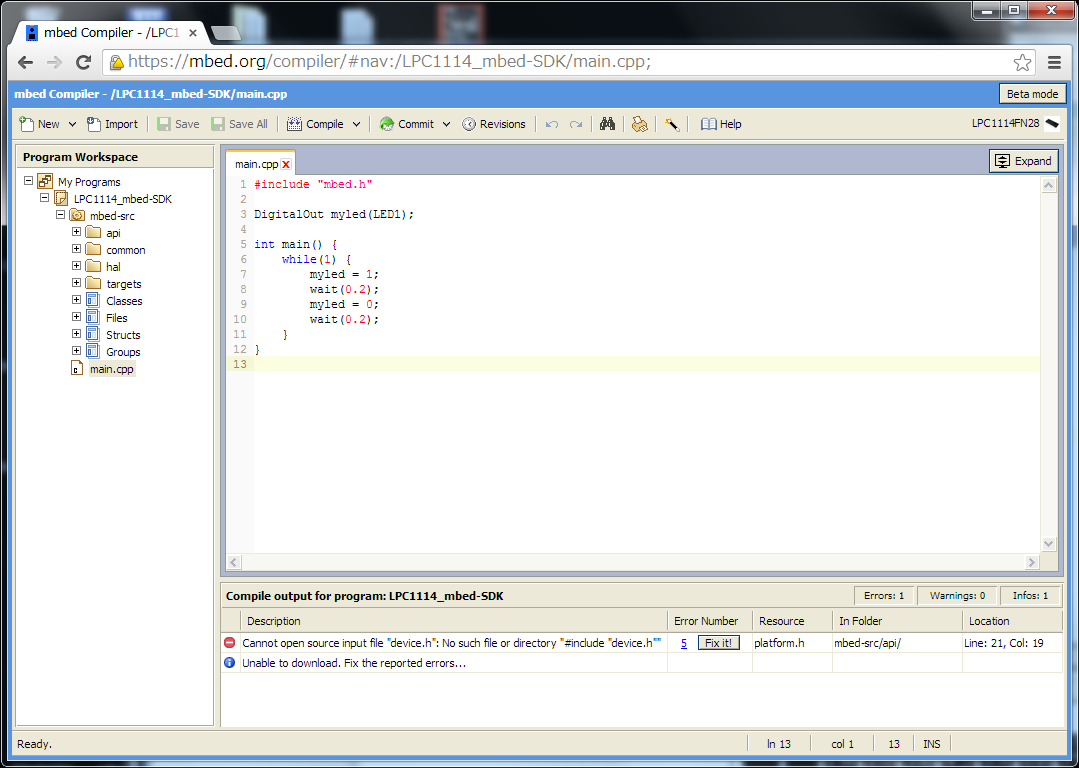Fork of mbed-src file paths change. LPC1114FN28 use only.
Fork of mbed-src by
Information
この情報は2013/10/28時点での解決方法です。
現在はmbed-src、標準ライブラリで問題なくコンパイルが可能です。
・使う物
LPC1114FN28
mbed SDK
LPC1114FN28でmbed-SDKのLibraryを使うとCompile出来ない。(2013/10/28)

パスが通ってないだけのようなのでファイルを以下に移動する。
| mbed-src\targets\cmsis\TARGET_NXP\TARGET_LPC11XX_11CXX\ mbed-src\targets\cmsis\TARGET_NXP\TARGET_LPC11XX_11CXX\TARGET_LPC11XX\ |
にあるファイルをすべて
| mbed-src\targets\cmsis\TARGET_NXP\ |
へ移動
mbed-src\targets\cmsis\TARGET_NXP\TARGET_LPC11XX_11CXX\にある
| TOOLCHAIN_ARM_MICRO |
をフォルダごと
| mbed-src\targets\cmsis\TARGET_NXP\ |
へ移動
| mbed-src\targets\hal\TARGET_NXP\TARGET_LPC11XX_11CXX\ mbed-src\targets\hal\TARGET_NXP\TARGET_LPC11XX_11CXX\TARGET_LPC11XX\ |
にあるファイルをすべて
| mbed-src\targets\hal\TARGET_NXP\ |
へ移動
移動後は以下のような構成になると思います。
※不要なファイルは削除してあります。
 |
ファイルの移動が面倒なので以下に本家からフォークしたライブラリを置いておきます。
Import librarymbed-src-LPC1114FN28
Fork of mbed-src file paths change. LPC1114FN28 use only.
エラーが出力される場合
"TOOLCHAIN_ARM_MICRO"が無いとエラーになる。
| Error: Undefined symbol _initial_sp (referred from entry2.o). Error: Undefined symbol _heap_base (referred from malloc.o). Error: Undefined symbol _heap_limit (referred from malloc.o). |
LPC1114FN28はMicrolibを使ってCompileされるため上記のエラーになるようです。
Diff: targets/hal/TARGET_NXP/TARGET_LPC176X/gpio_irq_api.c
- Revision:
- 43:b3acfef78949
- Parent:
- 42:7ca0bbba899b
--- a/targets/hal/TARGET_NXP/TARGET_LPC176X/gpio_irq_api.c Sun Oct 27 16:30:04 2013 +0000
+++ /dev/null Thu Jan 01 00:00:00 1970 +0000
@@ -1,161 +0,0 @@
-/* mbed Microcontroller Library
- * Copyright (c) 2006-2013 ARM Limited
- *
- * Licensed under the Apache License, Version 2.0 (the "License");
- * you may not use this file except in compliance with the License.
- * You may obtain a copy of the License at
- *
- * http://www.apache.org/licenses/LICENSE-2.0
- *
- * Unless required by applicable law or agreed to in writing, software
- * distributed under the License is distributed on an "AS IS" BASIS,
- * WITHOUT WARRANTIES OR CONDITIONS OF ANY KIND, either express or implied.
- * See the License for the specific language governing permissions and
- * limitations under the License.
- */
-#include <stddef.h>
-
-#include "gpio_irq_api.h"
-#include "error.h"
-#include "cmsis.h"
-
-#define CHANNEL_NUM 48
-
-static uint32_t channel_ids[CHANNEL_NUM] = {0};
-static gpio_irq_handler irq_handler;
-
-static void handle_interrupt_in(void) {
- // Read in all current interrupt registers. We do this once as the
- // GPIO interrupt registers are on the APB bus, and this is slow.
- uint32_t rise0 = LPC_GPIOINT->IO0IntStatR;
- uint32_t fall0 = LPC_GPIOINT->IO0IntStatF;
- uint32_t rise2 = LPC_GPIOINT->IO2IntStatR;
- uint32_t fall2 = LPC_GPIOINT->IO2IntStatF;
- uint8_t bitloc;
-
- while(rise0 > 0) { //Continue as long as there are interrupts pending
- bitloc = 31 - __CLZ(rise0); //CLZ returns number of leading zeros, 31 minus that is location of first pending interrupt
- if (channel_ids[bitloc] != 0)
- irq_handler(channel_ids[bitloc], IRQ_RISE); //Run that interrupt
-
- //Both clear the interrupt with clear register, and remove it from our local copy of the interrupt pending register
- LPC_GPIOINT->IO0IntClr = 1 << bitloc;
- rise0 -= 1<<bitloc;
- }
-
- while(fall0 > 0) { //Continue as long as there are interrupts pending
- bitloc = 31 - __CLZ(fall0); //CLZ returns number of leading zeros, 31 minus that is location of first pending interrupt
- if (channel_ids[bitloc] != 0)
- irq_handler(channel_ids[bitloc], IRQ_FALL); //Run that interrupt
-
- //Both clear the interrupt with clear register, and remove it from our local copy of the interrupt pending register
- LPC_GPIOINT->IO0IntClr = 1 << bitloc;
- fall0 -= 1<<bitloc;
- }
-
- //Same for port 2, only we need to watch the channel_index
- while(rise2 > 0) { //Continue as long as there are interrupts pending
- bitloc = 31 - __CLZ(rise2); //CLZ returns number of leading zeros, 31 minus that is location of first pending interrupt
-
- if (bitloc < 16) //Not sure if this is actually needed
- if (channel_ids[bitloc+32] != 0)
- irq_handler(channel_ids[bitloc+32], IRQ_RISE); //Run that interrupt
-
- //Both clear the interrupt with clear register, and remove it from our local copy of the interrupt pending register
- LPC_GPIOINT->IO2IntClr = 1 << bitloc;
- rise2 -= 1<<bitloc;
- }
-
- while(fall2 > 0) { //Continue as long as there are interrupts pending
- bitloc = 31 - __CLZ(fall2); //CLZ returns number of leading zeros, 31 minus that is location of first pending interrupt
-
- if (bitloc < 16) //Not sure if this is actually needed
- if (channel_ids[bitloc+32] != 0)
- irq_handler(channel_ids[bitloc+32], IRQ_FALL); //Run that interrupt
-
- //Both clear the interrupt with clear register, and remove it from our local copy of the interrupt pending register
- LPC_GPIOINT->IO2IntClr = 1 << bitloc;
- fall2 -= 1<<bitloc;
- }
-}
-
-int gpio_irq_init(gpio_irq_t *obj, PinName pin, gpio_irq_handler handler, uint32_t id) {
- if (pin == NC) return -1;
-
- irq_handler = handler;
-
- obj->port = (int)pin & ~0x1F;
- obj->pin = (int)pin & 0x1F;
-
- // Interrupts available only on GPIO0 and GPIO2
- if (obj->port != LPC_GPIO0_BASE && obj->port != LPC_GPIO2_BASE) {
- error("pins on this port cannot generate interrupts\n");
- }
-
- // put us in the interrupt table
- int index = (obj->port == LPC_GPIO0_BASE) ? obj->pin : obj->pin + 32;
- channel_ids[index] = id;
- obj->ch = index;
-
- NVIC_SetVector(EINT3_IRQn, (uint32_t)handle_interrupt_in);
- NVIC_EnableIRQ(EINT3_IRQn);
- return 0;
-}
-
-void gpio_irq_free(gpio_irq_t *obj) {
- channel_ids[obj->ch] = 0;
-}
-
-void gpio_irq_set(gpio_irq_t *obj, gpio_irq_event event, uint32_t enable) {
- // ensure nothing is pending
- switch (obj->port) {
- case LPC_GPIO0_BASE: LPC_GPIOINT->IO0IntClr = 1 << obj->pin; break;
- case LPC_GPIO2_BASE: LPC_GPIOINT->IO2IntClr = 1 << obj->pin; break;
- }
-
- // enable the pin interrupt
- if (event == IRQ_RISE) {
- switch (obj->port) {
- case LPC_GPIO0_BASE:
- if (enable) {
- LPC_GPIOINT->IO0IntEnR |= 1 << obj->pin;
- } else {
- LPC_GPIOINT->IO0IntEnR &= ~(1 << obj->pin);
- }
- break;
- case LPC_GPIO2_BASE:
- if (enable) {
- LPC_GPIOINT->IO2IntEnR |= 1 << obj->pin;
- } else {
- LPC_GPIOINT->IO2IntEnR &= ~(1 << obj->pin);
- }
- break;
- }
- } else {
- switch (obj->port) {
- case LPC_GPIO0_BASE:
- if (enable) {
- LPC_GPIOINT->IO0IntEnF |= 1 << obj->pin;
- } else {
- LPC_GPIOINT->IO0IntEnF &= ~(1 << obj->pin);
- }
- break;
- case LPC_GPIO2_BASE:
- if (enable) {
- LPC_GPIOINT->IO2IntEnF |= 1 << obj->pin;
- } else {
- LPC_GPIOINT->IO2IntEnF &= ~(1 << obj->pin);
- }
- break;
- }
- }
-}
-
-void gpio_irq_enable(gpio_irq_t *obj) {
- NVIC_EnableIRQ(EINT3_IRQn);
-}
-
-void gpio_irq_disable(gpio_irq_t *obj) {
- NVIC_DisableIRQ(EINT3_IRQn);
-}
-

